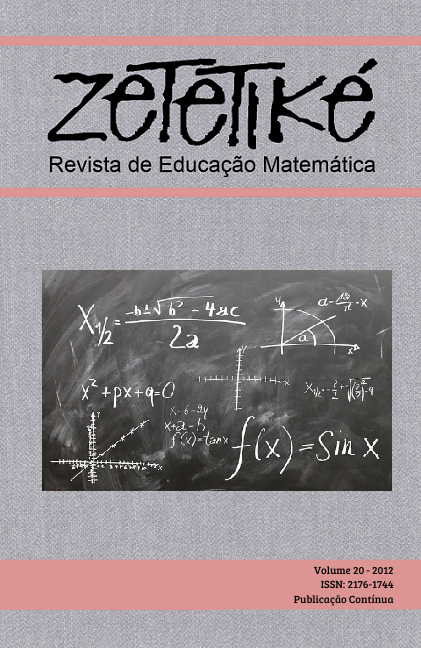Abstract
The present article discusses the autonomy development of a group of forty high school
students, during a learning strategy to work with Arithmetical and Geometrical Progressions. The
results integrate an investigation undertaken during the course and had as one of its objectives, the
construction of pointers and the monitoring of the evolution process related to the students’
autonomy. By the monitoring on of the students’ evolution in each stage of the procedure, the
autonomy indicators were determined. For each indicator the behaviors and degrees were mapped. The
results show that the strategies developed facilitate the students’ participation by questioning; planning
and comunication. The difficulties presented by the students were the oral explanation, the adaptation
to the requirements imposed for the tasks and the compliance of the activities.
References
AQUINO, J. G. (Org.) Autoridade e autonomia na escola: alternativas teóricas e práticas. São Paulo: Summus, 1999.
BERNARDO, G. Educação pelo argumento. Rio de janeiro: Rocco, 2007.
BOGDAN, R. C.; BIKLEN, S. K. Investigação qualitativa em educação. Porto: Porto Editora, 1994.
BRASIL. Lei de Diretrizes e Bases da Educação Nacional. Lei nº 9394, 20 de dezembro de 1996.
BRASIL. MEC. Secretaria Nacional de Educação Básica. Parâmetros Curriculares nacionais: matemática. Brasília: MEC/SEF, 2000.
CHEVALLARD, Y.; BOSCH, M.; GASCÓN, J. Estudar matemáticas: o elo perdido entre o ensino e a aprendizagem. Porto Alegre: Artmed, 2001.
COLL, C. Construtivismo em sala de aula. São Paulo: Ática, 1997.
DALBOSCO, A. (Org.). Filosofia prática e pedagogia. Passo Fundo: UPF, 2003.
FERNÁNDEZ, A. O saber em jogo: a psicopedagogia propiciando autorias de pensamento. Porto Alegre: Artmed, 2001.
FOUREZ, G. A construção das ciências: introdução à filosofia e à ética das ciências. São Paulo: Editora da Universidade Estadual Paulista, 1995.
FOUREZ, G. Alfabetización cientifica y tecnológica. Acerca de las finalidades de la ensenanza de las ciências. Buenos Aires, Argentina: Ediciones Colihue, 1997.
FREITAG, B. Itinerários de Antígona: a questão da moralidade. Campinas: São Paulo, 1997.
HUETE, J. C. S.; BRAVO, J. A. Fernández. O ensino da matemática: fundamentos teóricos e bases psicopedagógicas. Porto Alegre: Artmed, 2006.
KAMII, C. A criança e o número: implicações educacionais da teoria de Piaget para atuação junto a escolares de 4 a 6 anos. 14. ed. Campinas: Papirus, 2000.
LIMA, J. F. L. Reconstrução da tarefa educativa: uma alternativa para a crise e a desesperança. Porto Alegre: Mediação, 2003.
MACHADO, N. J. Educação: projetos e valores. São Paulo: Escrituras, 2004.
MIZUKAMI, M. G. N. Ensino: as abordagens do processo. São Paulo; EPU, 1986.
MORAES, R.; GALIAZZI, M. C. Análise textual discursiva. Ijuí: Unijuí, 2007.
TRIVIÑOS, A. N. S. Introdução à pesquisa em ciências sociais: a pesquisa qualitativa em educação. São Paulo: Atlas, 2008.

This work is licensed under a Creative Commons Attribution-NonCommercial-NoDerivatives 4.0 International License.
Copyright (c) 2014 Zetetiké: Revista de Educação Matemática

